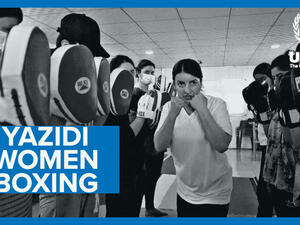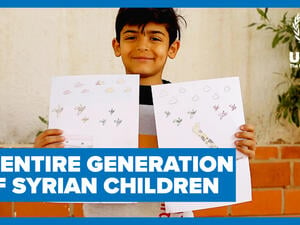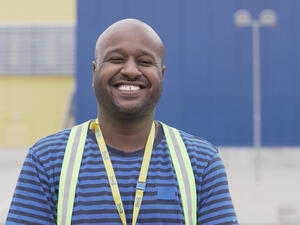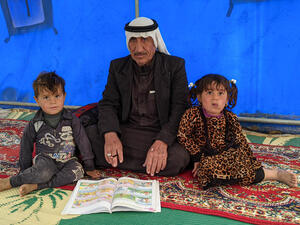Iraqi sculptor plies his trade in a country where art has lost its value
Iraqi sculptor plies his trade in a country where art has lost its value
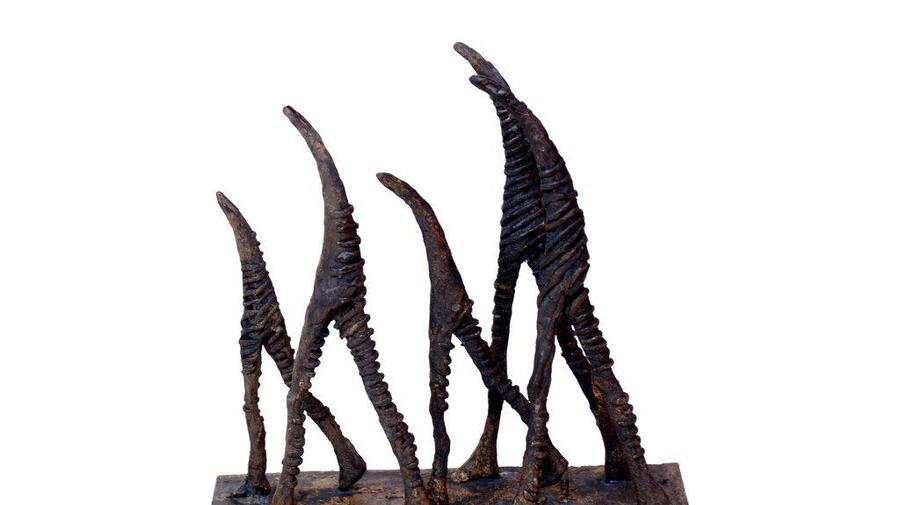
A bronze piece by Sadeq entitled, "The Displaced." It depicts the Iraqi exodus.
AMMAN, Jordan, October 12 (UNHCR) - Iraqi sculptor Sadeq has been driven throughout his life by a passion for art, and in recent years he has had to suffer for it at the hands of extremists who believed his work was forbidden by Islam.
But while others have fled their homeland to escape persecution, the 48-year-old has remained in Baghdad, struggling to make ends meet in a land where art seems to have lost its value. "I just work to satisfy myself," he told UNHCR recently at an art gallery in Amman, where his sculpture was being exhibited. "I have no customers, I have become so desperate."
Of course, it wasn't always like that. Sadeq recalled that his love of art began when he was a child. He used to spend hours in the gallery of the late Iraqi painter and sculptor, Ismail Fatah Al Turk, who convinced him to stop painting and shift to sculpture.
He graduated from the Baghdad College of Fine Arts in 1999 and began to build his reputation. Soon, his work was being exhibited regularly in galleries and institutions in Iraq and overseas, including Abu Dhabi, China and the United Kingdom.
But then came the United States-led invasion of Iraq in 2003 and the onset of a bitter sectarian conflict after the February 2006 bombing of the al-Askari Mosque in Samarra. Islamic fundamentalists on both sides came to the fore and artists were among those targetted.
Sadeq was abducted from his workshop by Islamic extremists who accused him of being a non-believer. They said sculpture was haram, or literally forbidden. His captors eventually released Sadeq, who had never imagined that his profession could be a death warrant in a land famed as a cradle of art and civilisation, a country whose artists were regarded as the best in the Arab world.
After his release, Sadeq moved his workshop to a safer area of Baghdad and has continued to pursue his profession. In the good old days, he had no difficulty selling his sculptures.
"Now, the situation has changed," he said, adding: "Baghdad is empty now, it is empty. We no longer see people who are interested in collecting artwork, the elite has left the country."
Sadeq welcomed the opportunity to display his work in Jordan and to talk about it in safety with other art lovers. Even the simple act of networking with other artists in Iraq has become extremely difficult due to the security situation.
The sculptor said he now put the anger and frustration he felt about the conflict in Iraq into his art. "When life is beautiful, our work is full of love and romance, but after the war, I started to reflect on the misery of the Iraqi people," he said.
One recent bronze piece titled, "The Displacement," is his depiction of the flight of millions of Iraqi civilians to neighbouring countries or to other parts of their homeland.
Sadeq's art gives him an escape of sorts, but he is always brought back to the grim reality of life at a time when the security situation remains tense for all Iraqis. His particular concern is for his three children, now that the academic year has just started.
"When a husband leaves his wife and children in the morning, they never know if they are going to meet again at the end of the day," said Sadeq.
In the safety of Amman, he pondered returning to an uncertain future in Baghdad while continuing to hope that things take a turn for the better. And he continues to dream of one day reaching a wider audience with his art. "I work for myself, hoping that, one day, history will record my work."
By Dana Bajjali in Amman, Jordan




